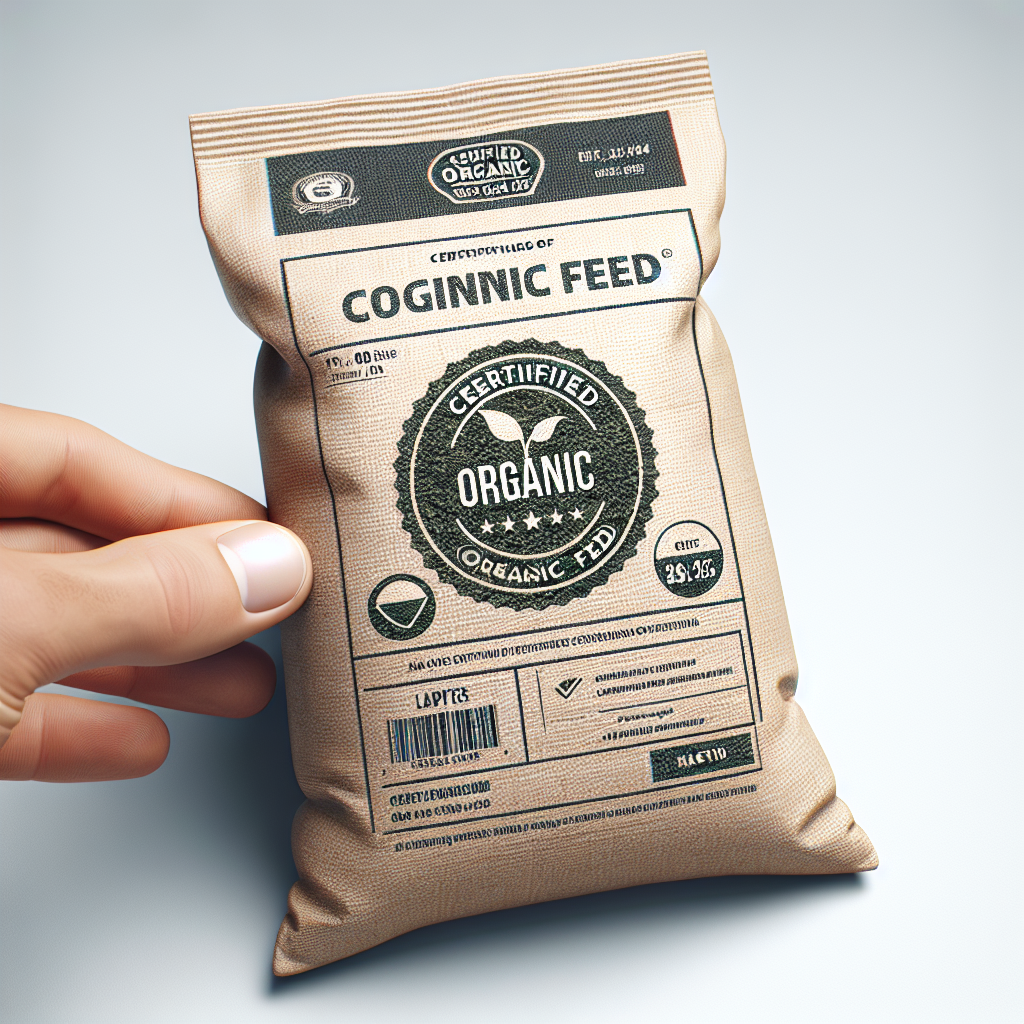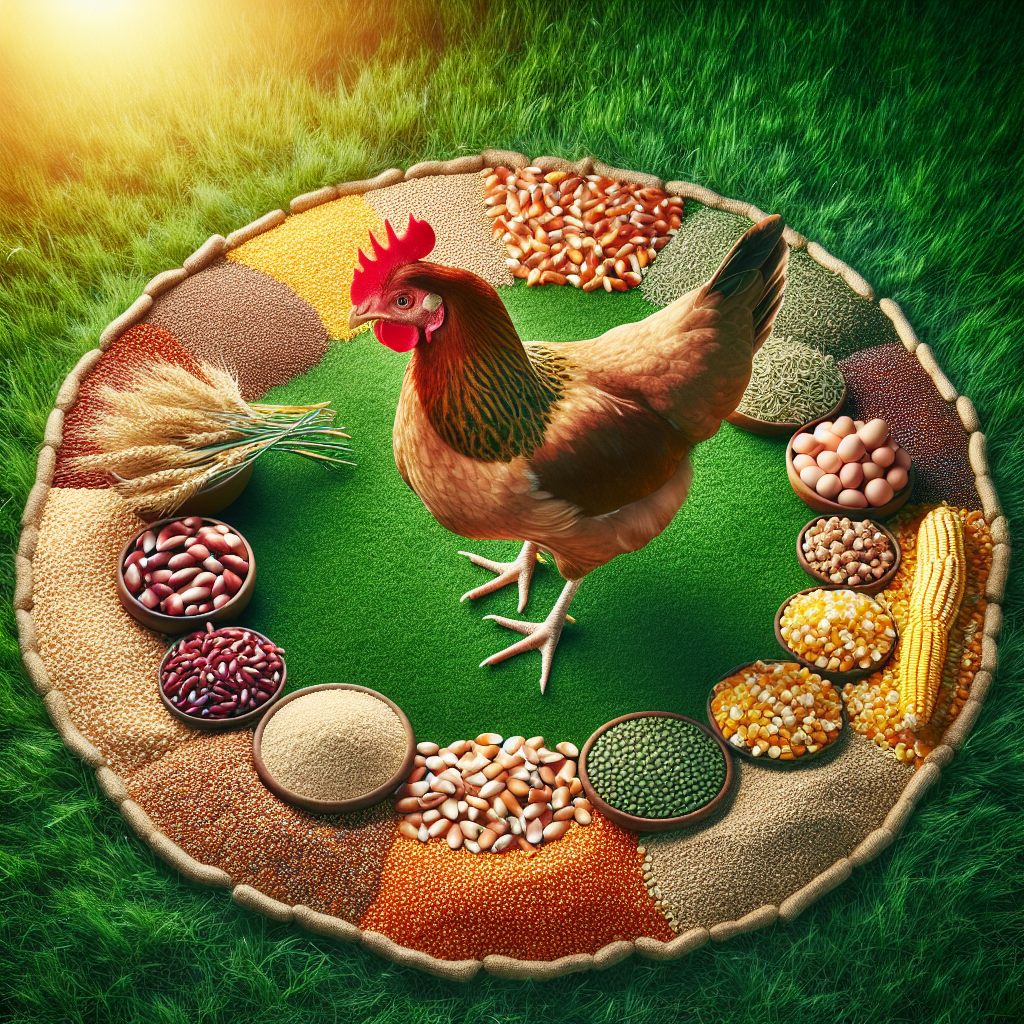In the world of chicken-keeping, the ongoing debate about what to feed these feathered friends continues to captivate the attention of enthusiasts. As the popularity of organic farming and sustainable practices rises, many poultry owners are wondering if certain breeds of chickens reap specific benefits from organic feeds. While the topic is hotly contested, some argue that heritage breeds, with their natural hardiness and ability to forage, may thrive even more when nourished with organic feeds. In this article, we will explore the potential advantages of organic feeds for various chicken breeds, diving into the exciting world of poultry nutrition.
Introduction
Organic feeds are an essential component of raising healthy and happy chickens. These feeds are produced without the use of synthetic pesticides, herbicides, or genetically modified organisms (GMOs), ensuring that the chickens are consuming natural and nutritious ingredients. By choosing organic feeds, you are not only promoting the well-being of your chickens but also contributing to a sustainable and environmentally friendly farming practice.
Definition of Organic Feeds
Organic feeds are specifically formulated to meet the nutritional requirements of chickens while adhering to strict organic standards. These feeds are made from high-quality, certified organic ingredients such as grains, seeds, and legumes that are grown without the use of synthetic fertilizers or chemicals. Organic feeds are free from artificial additives, antibiotics, and growth hormones, ensuring that the chickens are consuming wholesome and natural food.
Importance of Organic Feeds for Chickens
Choosing organic feeds for your chickens has numerous benefits. Firstly, organic feeds promote the overall health and well-being of the birds. They provide essential nutrients, vitamins, and minerals, which contribute to optimal growth, stronger immune systems, and increased disease resistance. In addition, organic feeds contribute to the production of healthier meat and eggs, free from harmful residues of synthetic chemicals. By feeding your chickens organic feeds, you are not only ensuring their welfare but also providing your family with safe and nutritious food.
Breeds Suited for Organic Feeds
When it comes to choosing the right breed for organic feeds, several factors come into play. Different breeds have specific characteristics and requirements that should be taken into consideration. Let’s explore some of the breeds that are well-suited for organic feeds.
Dual Purpose Breeds
Dual-purpose breeds are known for their versatility in both meat and egg production. They are larger in size and mature more slowly compared to other breeds. Some popular dual-purpose breeds include Rhode Island Red, Plymouth Rock, and Sussex. These breeds thrive on organic feeds, as they require a well-balanced diet to support both meat and egg production.
Heritage Breeds
Heritage breeds are traditional breeds that have been raised for centuries, often with historical and cultural significance. They are known for their hardiness, adaptability, and ability to forage. Breeds such as Orpington, Wyandotte, and Brahma are well-suited for organic feeds, as they have been raised on natural diets for generations.
Rare Breeds
Rare breeds, as the name suggests, are breeds that are at risk of becoming extinct. These breeds often have unique characteristics and genetic traits. Examples of rare breeds include the Dorking, Chantecler, and Houdan. Organic feeds play a significant role in preserving these rare breeds, as they provide the necessary nutrition for their survival and support the future of genetic diversity in poultry farming.
Free-Range Breeds
Free-range breeds are known for their ability to thrive in outdoor environments. They are active and enjoy foraging for their food. Breeds such as Australorp, Barnevelder, and Rhode Island Red are suitable choices for free-range organic farming, as they can take full advantage of the natural forage and organic feeds to maintain their health and productivity.
Egg-Laying Breeds
Egg-laying breeds are specifically bred for their high egg production. They are smaller in size and have a calm temperament. Some popular egg-laying breeds include Leghorn, Australorp, and Sussex. These breeds greatly benefit from organic feeds, as they require a nutrient-rich diet to support their egg-laying capabilities.
Factors to Consider
When selecting the right breed for organic feeds, it is essential to consider the following factors to ensure the well-being of your chickens:
Size of the Flock
The size of your flock is an important consideration when choosing breeds for organic feeding. Larger flocks may require breeds that are more self-sufficient and have stronger foraging abilities. In contrast, smaller flocks can benefit from breeds that have superior meat or egg production capabilities.
Purpose of the Chickens
Determining the purpose of your chickens is crucial. Are you primarily interested in meat production or egg-laying capabilities? Different breeds excel in different areas, so it’s important to select breeds that align with your goals for organic farming.
Environmental Conditions
The environmental conditions in which your chickens will be raised should also be considered. Certain breeds, such as those with heavy feathering, may fare better in colder climates, while others may be more resistant to heat.
Availability and Cost of Organic Feeds
It is important to consider the availability and cost of organic feeds in your area. While organic feeds provide numerous benefits, they may be more expensive or more challenging to obtain compared to conventional feeds. Understanding the availability and cost factors is crucial for sustainable organic poultry farming.
Management Practices
Your management practices, including housing conditions, access to outdoor space, and overall care, will also determine the success of organic feeding. Providing a suitable environment and implementing proper management practices will ensure the health and well-being of your flock.
Dual Purpose Breeds
Overview of Dual-Purpose Breeds
Dual-purpose breeds are a reliable choice for organic feeds due to their versatility. These breeds are well-suited for both meat and egg production, making them a popular choice among backyard chicken enthusiasts. They are typically larger in size, with strong and robust bodies. By feeding dual-purpose breeds organic feeds, you can enhance their overall growth, meat quality, and egg production.
Advantages of Organic Feeds for Dual-Purpose Breeds
Organic feeds offer several advantages for dual-purpose breeds. Firstly, the natural and certified organic ingredients provide the necessary nutrients and energy to support the birds’ dual-purpose capabilities. The absence of synthetic additives and hormones ensures that the chickens develop naturally, leading to healthier meat and eggs.
Furthermore, organic feeds contribute to the overall well-being and immune system strength of dual-purpose breeds. These breeds are often more susceptible to diseases, but a well-balanced organic diet can help boost their immunity and improve their ability to fight off infections.
Examples of Dual-Purpose Breeds
Some examples of popular dual-purpose breeds that greatly benefit from organic feeds include:
-
Rhode Island Red: This breed is known for its excellent meat quality and prolific egg production. It is a hardy breed that adapts well to various climates and management practices.
-
Plymouth Rock: The Plymouth Rock breed is highly regarded for its calm temperament and ability to withstand harsh conditions. It lays a good number of brown eggs, making it a favorite among backyard chicken keepers.
-
Sussex: Sussex chickens are known for their docile nature and exceptional foraging abilities. They produce a moderate number of eggs and have excellent meat qualities.
Heritage Breeds
Understanding Heritage Breeds
Heritage breeds are traditional breeds that have been raised for centuries. These breeds often have historical and cultural importance, representing the agricultural heritage of a region. They are known for their diverse genetic traits, adaptability, and ability to thrive in various environmental conditions. Heritage breeds have been raised on natural, organic diets for generations, making them an ideal choice for organic feeding.
How Organic Feeds Benefit Heritage Breeds
Organic feeds provide numerous benefits for heritage breeds. Since these breeds have been raised on organic diets historically, organic feeds allow them to maintain their natural behaviors, foraging abilities, and overall health. The absence of synthetic additives, GMOs, and growth hormones ensures that heritage breeds can express their genetic traits to the fullest.
By providing organic feeds, you are not only supporting the well-being of heritage breeds but also contributing to the preservation of cultural and genetic diversity in poultry farming.
Popular Heritage Breeds
Some popular heritage breeds that particularly benefit from organic feeds include:
-
Orpington: Orpington chickens are known for their large size, friendly nature, and good egg-laying capabilities. They are excellent foragers and adapt well to various climates.
-
Wyandotte: Wyandotte chickens are prized for their beautiful, laced plumage and excellent mothering abilities. They are robust birds that can thrive in both free-range and confinement systems.
-
Brahma: Brahmas are large, gentle birds known for their cold hardiness. They have exceptional foraging abilities and lay a decent number of eggs. Brahma meat is highly regarded for its flavor and tenderness.
Rare Breeds
Overview of Rare Breeds
Rare breeds, as the name suggests, are breeds that are at risk of becoming extinct. These breeds often have unique characteristics and traits that set them apart from more common breeds. The preservation of rare breeds is crucial for maintaining genetic diversity in poultry farming. Organic feeds play a significant role in supporting and preserving these rare breeds.
Unique Benefits of Organic Feeds for Rare Breeds
Organic feeds provide unique benefits for rare breeds. Since these breeds often have specific dietary requirements, organic feeds can be tailored to meet those needs precisely. The natural and certified organic ingredients ensure that rare breeds receive the necessary nutrition without the risk of synthetic additives or potentially harmful chemicals.
By using organic feeds, you are actively contributing to the survival and preservation of these rare breeds, ensuring that their genetic diversity is maintained for future generations.
Preserving Rare Breeds Through Organic Feeding
Organic feeding is an essential step in preserving rare breeds. By using organic feeds, you are supporting the natural behaviors, genetics, and health of rare breeds. Additionally, you are creating a demand for these breeds, encouraging breeders to continue raising and breeding them.
Preserving rare breeds through organic feeding is not only about ensuring their survival but also about upholding the historical and cultural significance of these breeds. By choosing organic feeds, you are actively participating in the conservation of genetic diversity in poultry farming.
Free-Range Breeds
Definition and Characteristics of Free-Range Breeds
Free-range breeds are chickens that have access to outdoor space, allowing them to roam and forage for their food. These breeds are highly active and enjoy exploring their environment. Free-range breeds require a suitable diet that supports their active lifestyle, making organic feeds an excellent choice.
Improved Health and Productivity with Organic Feeds
Organic feeds greatly contribute to the health and productivity of free-range breeds. The natural ingredients in organic feeds provide the necessary nutrients and energy required for the chickens’ active lifestyle. This, in turn, enhances their overall health, vitality, and ability to adapt to their surroundings.
Furthermore, organic feeds ensure that free-range breeds are not exposed to harmful substances or residues that may be present in conventional feeds. By feeding them organic feeds, you are providing them with a safe and healthy food source.
Examples of Popular Free-Range Breeds
Some popular free-range breeds that greatly benefit from organic feeds include:
-
Australorp: Australorps are highly active, foraging birds known for their excellent egg-laying capabilities. They produce large brown eggs and adapt well to various climates.
-
Barnevelder: Barnevelders are known for their beautiful feather patterns and sturdy build. They have good foraging abilities and lay medium-sized dark brown eggs.
-
Rhode Island Red: Rhode Island Reds are robust birds that adapt well to free-range environments. They are excellent foragers and lay a good number of eggs. They are also well-regarded as dual-purpose breeds.
Egg-Laying Breeds
Introduction to Egg-Laying Breeds
Egg-laying breeds are specifically bred for their high egg production. These breeds are smaller in size and have a calm temperament, making them suitable for backyard chicken keeping. Providing organic feeds to egg-laying breeds is crucial for ensuring their optimal egg quality and production.
Enhanced Egg Quality and Production Through Organic Feeds
Organic feeds play a significant role in enhancing egg quality and production in egg-laying breeds. The natural and well-balanced ingredients provide the necessary nutrients, vitamins, and minerals required for healthy egg development. This translates to eggs that are not only nutritionally superior but also have improved taste and color.
Furthermore, organic feeds contribute to the overall health and well-being of the hens, resulting in increased egg production and longer laying periods. The absence of synthetic additives and hormones ensures that the hens can express their natural egg-laying capabilities to the fullest.
Notable Egg-Laying Breeds
Some notable egg-laying breeds that particularly benefit from organic feeds include:
-
Leghorn: Leghorns are small and active birds known for their excellent egg-laying capabilities. They can lay up to 300-320 large white eggs per year.
-
Australorp: As mentioned earlier, Australorps are well-suited for free-range environments and are prolific egg layers. They produce large brown eggs and have a reputation for consistent egg production.
-
Sussex: Sussex chickens are known for their calm demeanor, adaptability, and good egg-laying abilities. They lay a good number of large brown eggs throughout the year.
Considerations for Organic Feeding
Transitioning from conventional to organic feeds requires careful consideration and planning. Here are some essential factors to keep in mind:
Transitioning from Conventional to Organic Feeds
When transitioning from conventional to organic feeds, it is important to do so gradually. Sudden changes in the diet can lead to digestive upset and stress in the chickens. Start by mixing small amounts of organic feeds with the existing feed and gradually increase the proportion of organic feeds over a few weeks.
Balancing Nutritional Requirements
Ensure that the organic feeds you choose meet the nutritional requirements of your chickens. Pay attention to the protein content, vitamin and mineral balance, and other essential nutrients. Consulting with a poultry nutritionist or researching reputable organic feed brands can help you make informed decisions.
Supplementing with Organic Treats and Forage
In addition to a well-balanced feed, chickens can benefit from organic treats and access to forage. Supplementing their diet with fresh fruits, vegetables, and herbs not only provides additional nutrients but also stimulates natural foraging behaviors. Allowing them to forage in a pesticide-free environment further enhances their well-being.
Ensuring Access to Clean Drinking Water
Clean drinking water is essential for the health and well-being of chickens. Ensure that your chickens have access to a constant supply of fresh, clean water. Regularly check and clean their water containers to prevent bacteria growth or contamination.
Monitoring for Any Adverse Effects
During the transition to organic feeds, closely monitor your chickens for any adverse effects. Pay attention to changes in their behavior, appetite, egg production, feather quality, and overall health. Any significant or prolonged negative effects should be addressed promptly to ensure the well-being of your flock.
Conclusion
Feeding your chickens organic feeds is a decision that not only benefits their health and well-being but also contributes to sustainable and environmentally friendly farming practices. The right breed selection, such as dual-purpose breeds, heritage breeds, rare breeds, free-range breeds, or egg-laying breeds, plays an important role in maximizing the benefits of organic feeds.
By choosing organic feeds, you are providing your chickens with natural, nutritious, and safe food sources. You are ensuring the production of high-quality meat and eggs that are free from harmful residues. Additionally, you are actively participating in the preservation of genetic diversity and the promotion of sustainable poultry farming practices.
As organic poultry farming continues to grow, the future prospects for organic feeds look promising. With increased awareness and demand for organic products, more research and innovation in organic feed formulations are expected, leading to even better health outcomes for chickens and, ultimately, for consumers.




